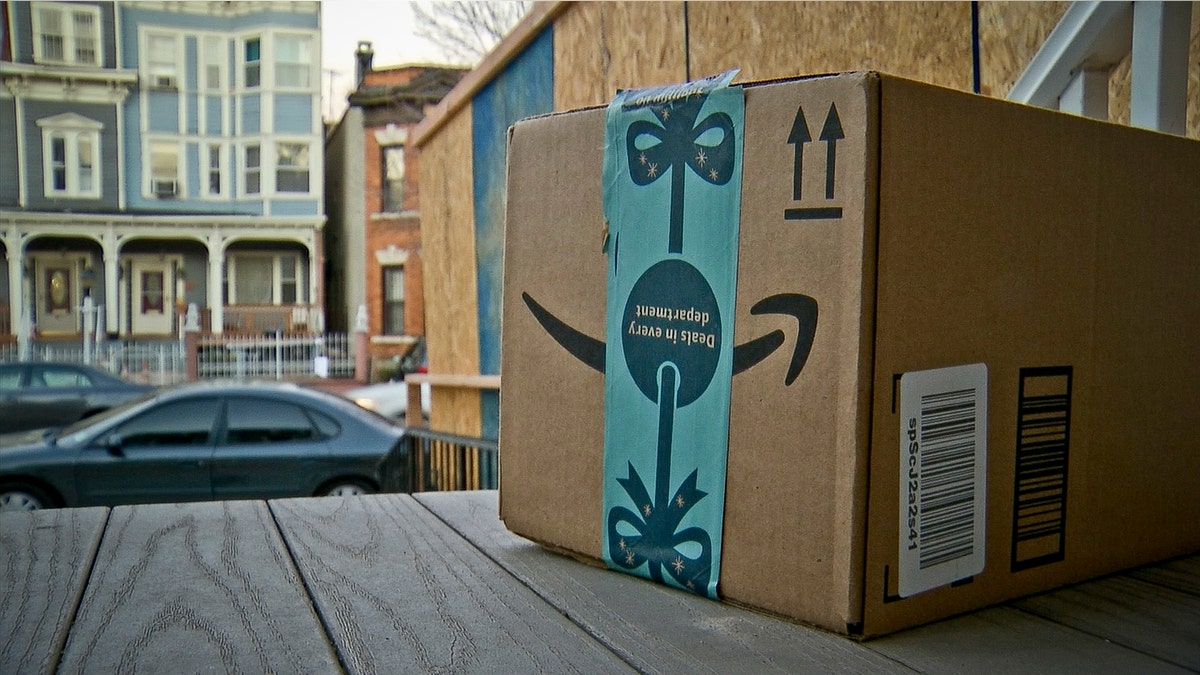
This image taken from video shows an Amazon package containing a GPS tracker on the porch of a Jersey City, N.J. residence after its delivery Tuesday, Dec. 11, 2018. The explosion in online shopping has led to porch pirates and stoop surfers swiping holiday packages from unsuspecting residents. The cops in one New Jersey city are trying to catch the thieves with some trickery of their own. (AP Photo/Robert Bumsted)
As the online shopping market continues to explode – it reached $121.5 billion, up 14 percent year-over-year in the third quarter according to the U.S. Department of Commerce – the biggest concern has been package theft, alarming shoppers, law enforcement and e-commerce companies alike.
Working in conjunction with Amazon, Jersey City police have taken the matter into their own hands to catch these so-called porch thieves, using technology.
The Jersey City police department installed doorbell cameras and planted fake packages with GPS tracking devices inside and waited for thieves to try and steal them. Much to no one's surprise, they did not have to wait long, with someone trying to take a package three minutes after it had been placed.
AMAZON EXECS GRILLED, JEERED AT NEW YORK CITY COUNCIL MEETING OVER HQ2
"We had a box out on the street for three minutes before it was taken," police Capt. James Crecco, who is overseeing the mission, told the Associated Press "We thought it was a mistake at first."
The suspect was caught, Crecco added. It is unclear if the suspect was subsequently charged with a crime.
According to a 2017 study, 11 million homeowners in the U.S. had packages stolen in the previous year. Approximately 53 percent of homeowners are concerned that packages left outside their homes can be stolen, and 74 percent of packages are stolen while homeowners are at work, adding to the problem.
Amazon — which is providing equipment free for the Jersey City program — declined to provide figures on how many packages are reported stolen or missing, as did UPS and FedEx.
"We absolutely report them to local law enforcement when we hear of them, and we encourage our customers to do the same," UPS spokesman Glenn Zaccara said.
Jersey City Police Chief Michael Kelly told The Associated Press that locations for cameras and boxes were selected using the city's own crime statistics and mapping of theft locations provided by Amazon.
"Most of the package thefts we've made arrests on revolve around (closed-circuit TV) or private surveillance cameras that give us a still image," Kelly said. "With the bait packages, some will be under video surveillance, and some will have GPS."
Several members of the Jersey City police department volunteered their dwellings to have the technology installed and the boxes placed. Jersey City Police Chief Michael Kelly told the AP that the program has been approved by a municipal prosecutor and hopes to expand the program, with Amazon's help.
AMAZON REPORTEDLY TARGETS AIRPORTS FOR CHECKOUT-FREE EXPANSION
The Jeff Bezos-led company has not yet responded to a request for comment from Fox News, but told the AP: "We appreciate the increased effort by local law enforcement to tackle package theft and remain committed to assisting however we can."
Similar programs have been tried in other cities including Albuquerque, New Mexico, and Hayward, California.
Amazon's mixed privacy efforts
Amazon has worked hard to stave off package theft in a number of different ways. Earlier this year, the tech giant acquired Ring, which makes video doorbells and a number of other home security products, for $1 billion. Upon completion the deal, the press release made sure to note that the "two companies will work together to accelerate Ring’s mission to reduce crime in neighborhoods..."
Despite this, there has been an outcry against Amazon from several groups who say that the tech giant is infringing upon people's privacy with its technology.
On Wednesday, the ACLU wrote a blog post about one of Amazon's patents that would add face surveillance to homeowner's front doors. "As a former patent litigator, I've spent a lot of time reading patents," Jacob Snow, Technology & Civil Liberties Attorney, ACLU of Northern California wrote in the post. "It’s rare for patent applications to lay out, in such nightmarish detail, the world a company wants to bring about. Amazon is dreaming of a dangerous future, with its technology at the center of a massive decentralized surveillance network, running real-time facial recognition on members of the public using cameras installed in people’s doorbells.
5 WAYS TO UNEARTH INCREDIBLE AMAZON DEALS
The company has also received a significant amount of blowback for its Rekognition facial recognition technology, both from its employees and those who have bemoaned it could lead to mass surveillance in the not-too-distant future.
In July, the Rekognition facial surveillance technology wrongly tagged 28 members of Congress as police suspects, according to ACLU research.
Fox News' James Rogers, Christopher Carbone and the Associated Press contributed to this story. Follow Chris Ciaccia on Twitter @Chris_Ciaccia




















